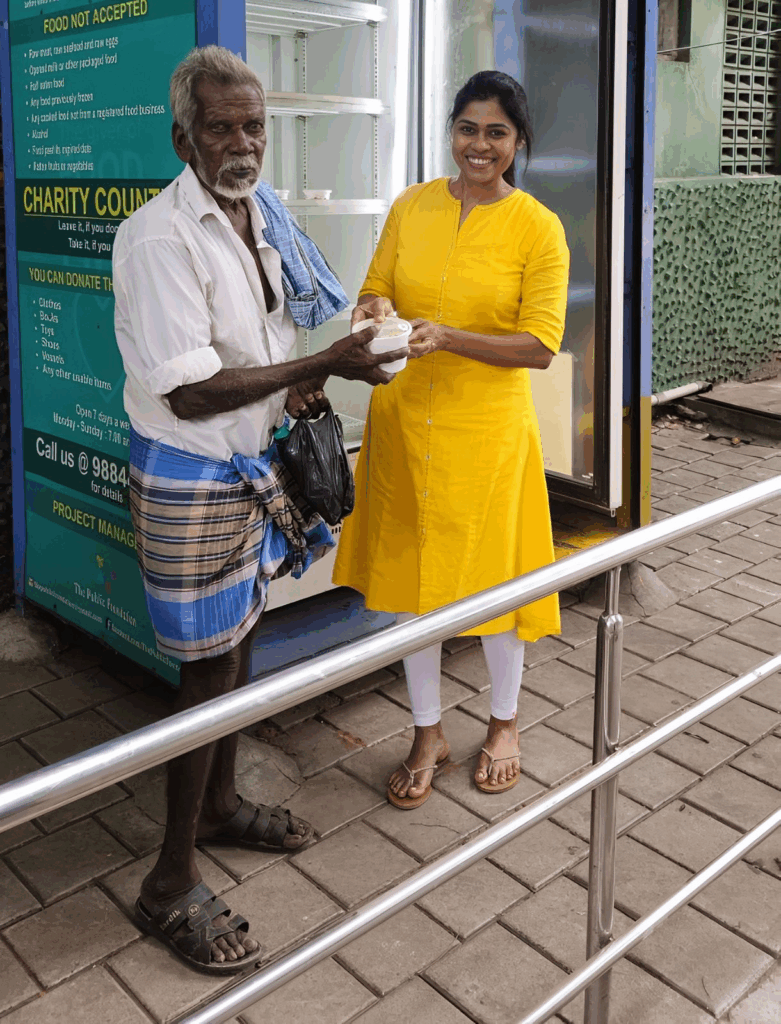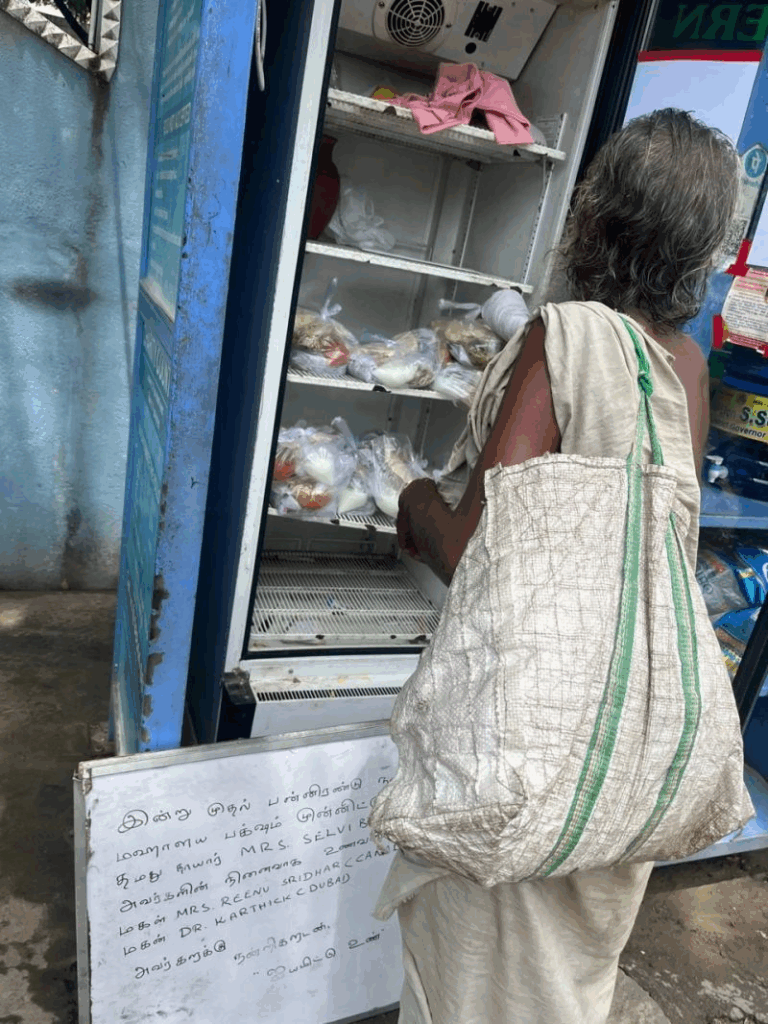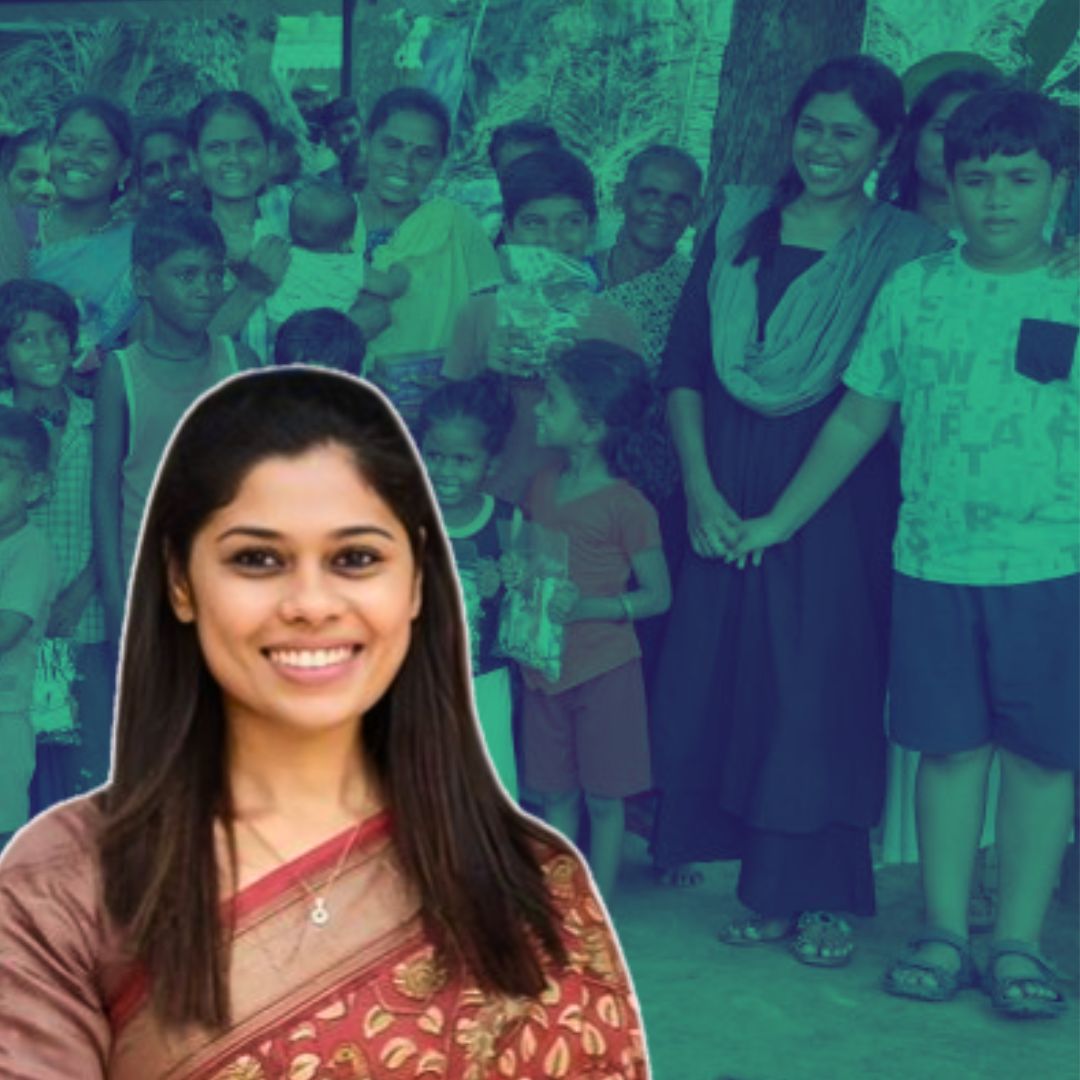Dr. Issa Fathima Jasmine is a dentist whose work is driven by a deep belief that kindness must be practical and accessible. She transformed her everyday experience with food surplus into The Public Foundation, carving out a new path where dignity is central to giving and taking.
Rather than viewing charity as one-sided, she built community fridges so anyone could share or receive, breaking barriers and removing stigma. Her initiative is rooted in the conviction that true change comes from shared responsibility, from enabling everyday city-dwellers and neighbours to participate, not just witness.
The result isn’t measured in statistics, but in quiet moments a cab driver’s gratitude, a child’s pride in volunteering, a neighbourhood’s embrace of mutual care. Issa’s approach proves that when compassion becomes routine, hunger dissolves and kindness grows, one act and one smile at a time.

The Spark: Confronting Hunger, Confronting Waste
As told to The Logical Indian, Kindness, to Issa Fathima, has never been theoretical. “A hungry person doesn’t need sympathy; they need food, dignity, and access,” she explains. The roots of The Public Foundation are personal Issa often had leftover food but no reliable way to share it.
“Sometimes I’d look for someone to hand it to, but it wasn’t always easy. Hunger isn’t always obvious or visible.” The reality hit hardest when her regular recipient passed away, forcing her to confront how easily good intentions still led to food going waste.
Issa started small. “If I could have one extra pack of food daily, imagine the potential across a whole community,” she noted. She realized India’s hunger wasn’t a question of insufficient supply “we produce more than enough, but lack the systems and attention to share it.”
She recalls, “For me, it was never about charity. It was, and still is, about shared responsibility. When everyone contributes in big or small ways hunger becomes a solvable problem.”

Building the System: The Community Fridge
Transforming an idea into practice proved challenging. “I thought, why can’t my fridge come outside so everyone can benefit?” she says. Installing the first public refrigerator later named ‘Ayyamittu Unn’, after a Tamil phrase meaning ‘feed the hungry’ required convincing mall owners, local authorities, and the public, all of whom doubted it would work.
“People asked who would keep it clean, who would pay for the electricity, what if food went stale, or what if their business was disrupted?” she recalls. Most saw it as high-risk, low-benefit. But Issa persisted, backed by her own belief and her fifteen-year-old child’s encouragement.
Once the first fridge was in place, acceptance grew. The system is elegantly simple: donate cooked or packaged food, clothes, stationery, or toys; those in need take what they require, no questions asked.
“We have a logbook system donors specify what they leave, its expiry, and allergy information. Project coordinators and security staff clean and manage each fridge daily, ensuring safety and hygiene.
We want users to feel the same dignity as anyone shopping from a store shelf never humiliation, only participation.”

Stories from the Ground: Impact Beyond Numbers
Real stories reveal the true impact. “One day a taxi driver called me on our public helpline. He said, ‘Before my first ride, I don’t always have money for breakfast.
Your fridge has been like a mother caring, anonymous, and always there. Even the water bottles mean a lot.’” For Issa, these small gestures matter most: “The most powerful moments aren’t loud. They’re the quiet ‘thank yous’ the invisible relief you witness in someone’s eyes.”
Fridges have become neighborhood anchors. “We invite local schools, restaurants, and bakeries to contribute surplus. Residents help clean, donate, and spread the word. Responsibility is shared there’s no hierarchy. When everyone takes ownership, nothing feels impossible.”
Her model’s transparency and record-keeping also help: “We track every meal, rupee, and packet. But the real impact is in the culture volunteers donating on birthdays, kids coming with parents, communities getting involved. Kindness is not quantitative; it’s visible when your neighborhood cares, when generosity becomes routine.”

Challenges, Replication, and the Power of Starting
Replication calls pour in from across India Bangalore, Vellore, Sri Lanka, Andaman, Delhi, Mumbai, Pune, and beyond. Issa offers a blueprint: “You need a space, a fridge, an electric point, and a committed coordinator.
That’s it. Kindness multiplies. The harder challenge isn’t logistics it’s skepticism. People doubt, but when they see it working, they protect, nurture, and grow the idea.”
For aspiring changemakers, her advice is unwavering: “Don’t wait for the perfect plan or funding. Start small, start now.
When an elderly man once brought fruits just because he saw what we were doing, his words stayed with me: ‘Don’t wait for a good day to do good things.’ That’s been my mantra.”

Navigating Identity: Sarees, Stereotypes, and Bridges Over Walls
Issa speaks candidly about societal prejudices. “I face questions about being a woman in a saree whether traditional looks equal traditional thinking, or whether ‘modern’ changemakers need to look a certain way.
I want every girl to know you can pursue any dream in your own way, in your own skin. Culture and tradition are strengths, not barriers.”
Of criticism, she says: “Each ‘no’ sharpened my ‘yes’. Criticism destructive or constructive is a building block. You can either use stones for a wall, shutting yourself off, or for a bridge, connecting with others.
I choose the bridge.” To her, success is deeply personal: “If even one hungry person eats because of our work, if I can end each day content I did my best, I have succeeded.”

Vision: From Routine to Curriculum
Issa’s dream is bigger than feeding people today she wants to reshape culture for tomorrow. If resources were no barrier, she’d “launch a kindness curriculum in every school teach gratitude, giving, empathy from childhood.”
She believes real change begins with habit. “If we raise children who are kind by default, hunger and apathy don’t stand a chance.” Her father’s wisdom echoes: “Beauty is not in the ornaments you wear, but in the hand that gives selflessly.”

The Logical Indian Perspective
Issa Fathima’s journey displays the essence of real, Indian changemaking practical, persistent, people-first. Her story demonstrates the power of community fridges in converting surplus to sustenance, and stigma to shared pride. Through fridges, she’s built more than a hunger program she’s ignited a quiet revolution of mutual care.
Her example underlines what The Logical Indian values most: solutions rooted in dignity, participation, and replicable hope. She proves women aren’t just participants in social change they’re its architects, redefining leadership, compassion, and what it means to serve.
When kindness becomes habit consistently shown, freely given, and collectively owned hunger, isolation and prejudice lose their ground. And India inches closer to the future it deserves.











